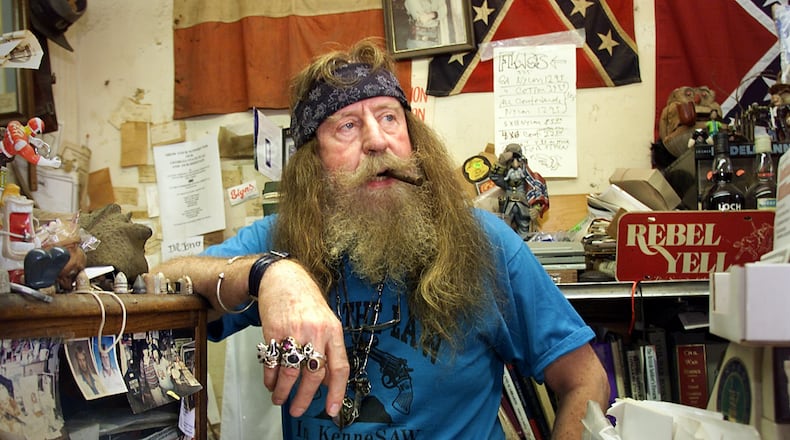Dent “Wildman” Myers, who operated a controversial Civil War relic and Confederate memorabilia store in Kennesaw for more than 50 years and claimed to be the reincarnation of Confederate Gen. Thomas “Stonewall” Jackson, made his name and livelihood off the past. But he also looked to the future.
In 2012, convinced the world was about to end, Myers built his own massive tombstone in Kennesaw City Cemetery. The 15-foot-tall monolith includes his death mask, a Confederate flag, his Civil War re-enactor rank — “Lt. Gen. Dent Myers CSA Ret.” — and the year of his presumed death, 2012.
Instead, he died Jan. 16, 2021, at the age of 90. A cause of death has not been made public.
Wildman’s Civil War Surplus store became a polarizing downtown site for the Cobb County town. It featured a mannequin in a Ku Klux Klan robe and hood with a noose, artifacts from Nazi Germany, Confederate memorabilia, and items depicting Black people using the worst kinds of racial stereotypes displayed on shelves labelled with racial slurs. In 2007 the Southern Poverty Law Center, which monitors extremist groups, paid him a visit.
“I’ve been called a racist, redneck, honky bigot,” he told the center. “I just let it slop off me like a proverbial duck, ‘cept my feathers don’t get ruffled.”
Myers claimed his store, which he dubbed “The Best Little War House in Kennesaw,” was a museum. “It’s all history, regardless of what you think about it,” he told The Atlanta Journal-Constitution in 2020.
Credit: AJC Staff
Credit: AJC Staff
He greeted customers and posed for photos in his standard outfit of head bandana, store T-shirt and jeans, with a pair of 45.caliber pistols strapped to his waist. He wore multiple silver rings. His beard was vast and grew white over the years. His hair was hippie-length.
“He represented the worst of old Cobb County, the worst of the Old South,” said Doug Monroe, who is a former Atlanta Journal-Constitution Cobb County bureau chief and senior editor of Atlanta magazine.
“Cobb County was a very different place years ago,” Monroe said. “Its history in regard to race and the Confederacy is pretty dark. Dent reflected that back in the ‘80s.”
Jimmy Dickens, a Black man who is a former city council member and a partner in Kennesaw’s Amazing Cuts barber shop, had a different take on Myers. He heard about Myers when he moved to Kennesaw in 2005 and asked him to lunch.
“I asked him if he liked Black people,” Dickens said. “He said I don’t hate no man. I don’t hate Blacks or Jews. But what I hate is you guys come here to my country and trickle on down to Kennesaw, and I had to adapt to your slang language, the way that you dress, your culture, the way you live. We were fine in Kennesaw the way we were before you trickled down here.
“I said, Mr. Myers, we just didn’t trickle down to Kennesaw. We were fine where we were. We were brought over here and we cropped your lands and we built your railroads and your [ancestors] did what they wanted to our daughters and wives and mothers. We had to adapt to your language and culture. And we’re here now and we need to find a common ground.
“He told me: You and me will be friends. No one has ever explained it to me that way,” Dickens said. “And from that day forward we were friends. He treated me with respect. And I’m gonna miss him.”
Myers opened his store in 1971 and got media attention in 1982, when Kennesaw passed an ordinance requiring all citizens to own a gun and ammunition. He was always armed, outspoken and willing to pose for cameras for local and national media.
He was active in Civil War reenactor groups, and when dressed as Stonewall Jackson was “so believable it was scary,” said Dale Spratlin, an Austell retired tattoo artist who met Myers in 1966 when they worked at Lockheed Martin’s Marietta factory. “He helped train hundreds of reenactors in the hobby, showing what their representation should be. He wanted the reenactments to be as real as possible.”
In 1993, the Kennesaw Historical Society awarded Myers its first Historic Preservation Award. The group was rebooted in recent years and left Myers in the past. “The group as it stands now has not had any dealings with Dent,” said a spokesperson.
In the summer of 2020, dozens of Black Lives Matter protesters showed up outside Myers’ store. Many were Kennesaw State University students. Myers occasionally spoke with the protestors and there was no violence.
Credit: John Amis
Credit: John Amis
In 2021, a left-wing “activist art collective” painted a brick wall outside the store with what it called “antifa Smurfs.” The group, Indecline, issued a news release saying activists spent about six months visiting Wildman’s, posing as Civil War enthusiasts. They said they gained the trust of Myers, who gave them permission to paint the wall, not knowing how they would paint it.
Attempts to contact Myers’ family were not successful. In a post announcing his death, his shop’s Facebook page said a public memorial will be held at a later date.
About the Author
The Latest
Featured




